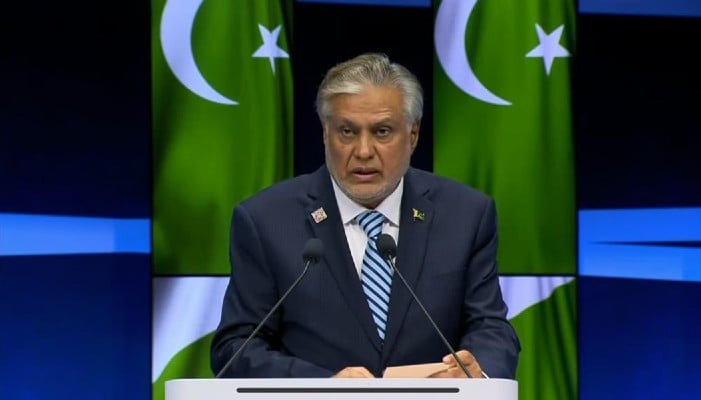
In the latest display of internal discord within the Sharif dynasty, Prime Minister Shehbaz Sharif has picked Foreign Minister Ishaq Dar over Finance Minister Muhammad Aurangzeb as President Asif Ali Zardari has reconstituted the Council of Common Interest (CCI) by excluding financial czar from it on premier’s advice.
Knowing that no constitutional body is considered complete without the finance minister, the prime minister has still excluded Aurangzeb from the CCI and included Dar just days after he carved out a major role for the foreign minister while reconstituting several financial committees.
A week ago, the premier had clipped the finance minister’s decision-making wings when he deprived him of the chairmanship of the most important Economic Coordination Committee (ECC) of the cabinet but only to reverse his decision in no time.
It seems PM Shehbaz has been facing difficulties in constituting different committees since the formation of the government as he has been unable to exclude Dar – a close family member, key party leader and one who repeatedly served as finance minister during PML-N’s tenures – even from the committees that have less to do with the foreign minister and more with the finance minister.
For instance, the foreign minister was made the chairman of the Cabinet Committee on Privatisation (CCOP) – a position previously held by the finance minister before the Pakistan Democratic Movement government – which was later transferred to Privatisation Minister Fawad Hasan Fawad.
Privately, the PML-N officials also admit that the tussle regarding the appointment of a new finance minister in place of Dar started when the party decided to form government in the Center. Though Dar was ultimately not made the finance minister, they said, it was still difficult to keep him limited to matters pertaining to foreign affairs.
“You can take Dar out of finance ministry but you can never take finance ministry out of Dar,” a PML-N lawmaker quipped while commenting on the situation, saying the inclusion of foreign minister in committees dealing with financial affairs shows a glimpse of it.
Read PM clips finance minister’s decision-making wings
According to the notification issued on March 25, President Zardari while exercising the powers conferred under Article 153 of the Constitution, “the President on the advice of the Prime Minister, has constituted the Council of Common Interests, with effect from 21st March 2024”.
As per the notification, the Prime Minister is the chairman while the chief ministers of Balochistan, Khyber Pakhtunkhwa, Punjab and Sindh are its members. Apart from the PM and four provincial chiefs, Dar, Defence Minister Khawaja Asif and Minister for States & Frontier Regions (SAFRON), Engr. Amir Muqamisre a members of CCI.
The previous notification issued on January 9 this year shows that the interim finance minister was a member of CCI. However, the new notification doesn’t include the incumbent financial czar in CCI, indicating that the tussle has deepened in the House of Sharifs as well as in the power corridors when it comes to the composition of new committees.
Article 154(1) of the Constitution states that “The Council shall formulate and regulate concerning matters in Part II of the Federal Legislative List and shall exercise supervision and control over related institutions.”
Article 154 (3) provides that the Council shall have a permanent Secretariat and shall meet at least once in ninety days. Article 155 of the Constitution extends the purview of CCI on the resolution of a dispute between the federation and the federating units or area’s governments regarding their rights to water from any natural source and authorizes the federal or provincial government concerned to make a complaint to CCI.
It says that the CCI can either decide or recommend the President to set up a Commission consisting of persons having knowledge and experience in irrigation, engineering, administration, finance and law under the Pakistan Commissions of Inquiry Act, 1956.
As regards “Electricity”, Article 157 while authorising the federal government to construct a hydro-electric or thermal power installation in any province in consultation with that province also authorizes the provincial governments to draw bulk supply from the national grid for transmission and distribution within the province, levy taxes on consumption, construct power houses and grid stations and lay transmission lines and also to determine electricity tariff within the province.
In case of any dispute in the matter, the federal or provincial government can approach the CCI for resolution of the dispute.
Federal Minister for Information and Broadcasting Attaullah Tarar was approached for comments on why the finance minister has been excluded and the foreign minister included in CCI and if there was a specific reason for it.
However, his comments didn’t come till the filing of the story.




1730959638-0/trump-(19)1730959638-0-165x106.webp)

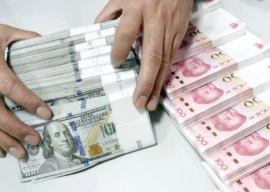
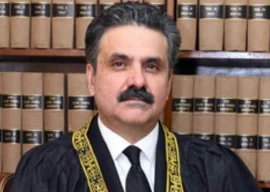
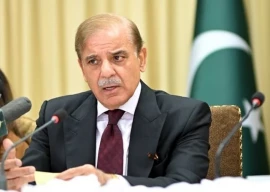



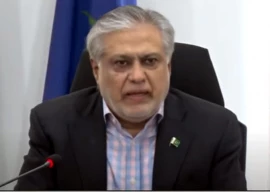
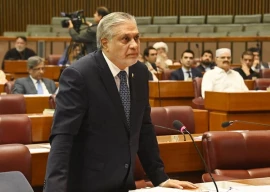






COMMENTS (3)
Comments are moderated and generally will be posted if they are on-topic and not abusive.
For more information, please see our Comments FAQ